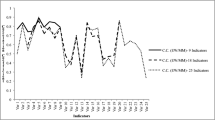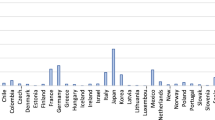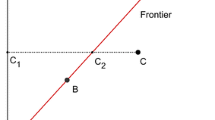Abstract
This article presents the estimation of a synthetic economic wellbeing index using Data Envelopment Analysis (DEA). The DEA is a multidimensional technique that has its origins in efficiency analysis, but its usage within the social indicators context is particularly appropriate. It allows the researcher to take advantage of the inherent flexibility of DEA when assigning weights to the factors. The model itself carries out the aggregation and weighting of 8 partial indicators, which attempt to describe the four components of economic wellbeing suggested by Osberg (Royal Commision on the Economic Union and Development Prospects for Canada (University of Toronto Press, 1985)), in order to assess the economic wellbeing of the 50 Spanish provinces. By using the index obtained in the analysis a “ranking” of the provinces is obtained. This ranking proves to be relatively similar to the one that corresponds to per capita income, although there are significant differences.
Similar content being viewed by others
References
BBVA Foundation (2003) El stock de capital en España y su distribución territorial (1964–2000), M. Mas, F. Pérez and E. Uriel (dirs).
Boscá, J.E., A. Martínez, V. Liern, and R. Sala: 2004, Una aplicación del análisis de la eficiencia técnica al fútbol. España e Italia. Temporadas 2000/01 y 2001/02, book in tribute to Albert Biayna, University of Barcelona, Barcelona (in press).
A. Charnes W.W. Cooper E. Rhodes (1978) ArticleTitle‘Measuring the efficiency of decision making units’ European Journal of Operational Research 2 429–444 Occurrence Handle10.1016/0377-2217(78)90138-8
C. Cobb T. Halstead J. Rowe (1995) The genuine progress indicator: summary of data and methodology Redefining Progress San Francisco
E. Diener (1995) ArticleTitle‘A value based index for measuring national quality of life of nations’ Social Indicators Research 36 107–127 Occurrence Handle10.1007/BF01079721
Goerlich, F. and M. Mas: 1999, Medición de la desigualdad: contribución a una base de datos regional (Valencian Institute of Economic Research, Valencia).
A. Hashimoto H. Ishikawa (1993) ArticleTitle‘Using DEA to evaluate the state of society as measured by multiple social indicators’ Socio-Economic Planning Sciences 27 257–268 Occurrence Handle10.1016/0038-0121(93)90019-F
A. Hashimoto M. Kodama (1997) ArticleTitle‘Has livability of Japan gotten better for 1956–1990? A DEA approach’ Social Indicators Research 40 359–373 Occurrence Handle10.1023/A:1006804520184
A. Hashimoto (1993) ArticleTitle‘Evaluating baseball batters using DEA’ Communications of the Operations Research Society of Japan 38 146–153
A. Hashimoto (1996) ArticleTitle‘A DEA selection system for selective examinations’ Journal of the Operations Research Society of Japan 39 475–485
A. Hashimoto (1997) ArticleTitle‘A ranked voting system using a DEA/AR exclusion model: A note’ European Journal of Operational Research 97 600–604 Occurrence Handle10.1016/S0377-2217(96)00281-0
Hashimoto, A.: (1999) Proposing non-uniform evaluation in social systems analysis, Discussion Paper Series, 827 (Institute of Policy and Planning Science, University of Tsukuba).
Z. Juan J. Jin J. Wang (1994) ArticleTitle‘Data Envelopment Analysis method & transport enterprise technique scale effectiveness’ Journal of Highway and Transportation Research and Development 11 44–50
Z. Juan J. Wu M. McDonald (2003) ArticleTitle‘The socio-economic impacts assessment of advanced convoy driving on motorway’ Transportation Research Part A 37 731–747 Occurrence Handle10.1016/S0965-8564(03)00045-4
M.J. Mazur (1994) ‘Evaluating the relative efficiency of baseball players’ A. Charnes W.W. Cooper A. Lewin M. Seiford (Eds) Data Envelopment Analysis: Theory, Methodology, and Application Kluwer Academic Publishers Boston 369–391
W.D. Nordhaus (2002) ‘The health of nations: the contribution of improved health to living standars’ K.M. Murphy R.H. Topel (Eds) Exceptional Returns University of Chicago Press Chicago
Osberg, L.: 1985, ‘The measurement of economic wellbeing,’ in Approaches to Economic Well-being, 26 (Coord.) D. Laidler, Royal Commission on the Economic Union and Development Prospects for Canada (University of Toronto Press, Toronto).
Osberg, L. and A. Sharpe: 1998, ‘An index of economic well-being for Canada’, Applied Research Branch, Research Paper R-99–3E, Human Resources Development Canada, Ottawa, Ontario.
Osberg, L. and A. Sharpe: 2003, ‘Human well-being and economic well-being: what values are implicit in current indices?,’ CSLS Research Report, 2003–2004. Canada.
Osberg, L. and A. Sharpe: 1999, ‘An index of economic well-being for Canada and the United States,’ paper presented at the annual meeting of the American Economic Association, New York, January.
Sen, A.: 2000, Desarrollo y libertad, (Editorial Planeta, Barcelona).
Spanish Statistical Office: 2003, Social Indicators and Spanish Regional Accounts, avaliable from: http://www.ine.es
Spanish Statistical Office: 2003, Spanish Regional Accounts, Social Indicators and Official Census of Population and Housing 2001, avaliable from: http://www.ine.es
Zarzosa, P.: 1996, Aproximación a la medición del bienestar social (Service of Publications, University of Valladolid, Valladolid).
J. Zhu (2001) ArticleTitle‘Multidimensional quality-of-life measure with an application to Fortune’s best cities’ Socio-Economic Planning Sciences 35 263–284 Occurrence Handle10.1016/S0038-0121(01)00009-X
J. Zhu (2003) ArticleTitle‘Identifying “best” applicants in recruiting using Data Envelopment Analysis’ Socio-Economic Planning Sciences 37 125–139 Occurrence Handle10.1016/S0038-0121(02)00048-4
Author information
Authors and Affiliations
Corresponding author
Rights and permissions
About this article
Cite this article
Murias, P., Martinez, F. & De Miguel, C. An Economic Wellbeing Index for the Spanish Provinces: A Data Envelopment Analysis Approach. Soc Indic Res 77, 395–417 (2006). https://doi.org/10.1007/s11205-005-2613-4
Accepted:
Issue Date:
DOI: https://doi.org/10.1007/s11205-005-2613-4




